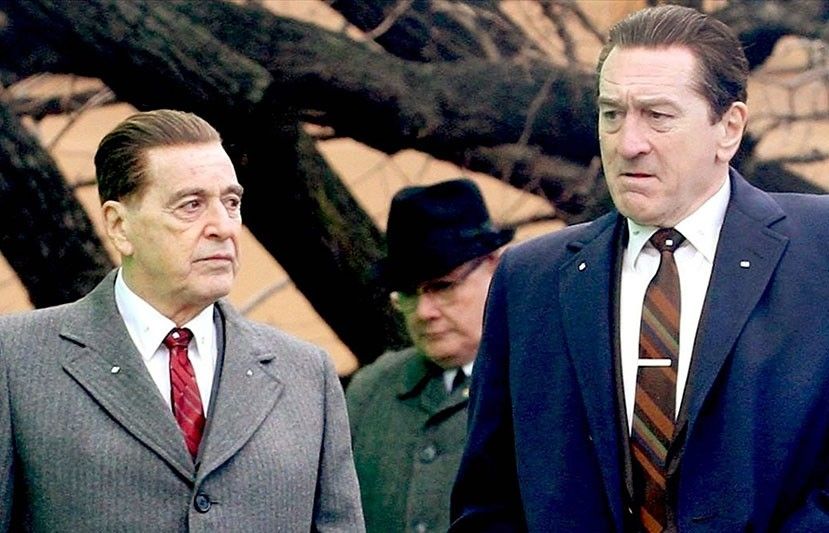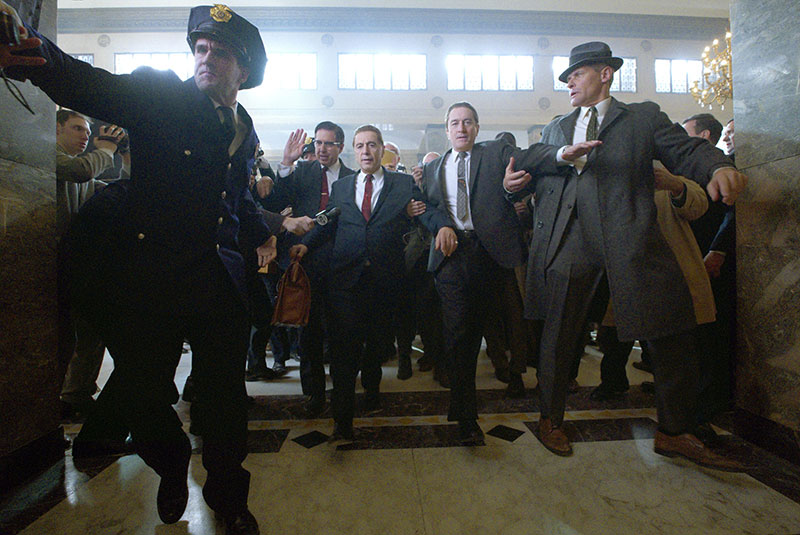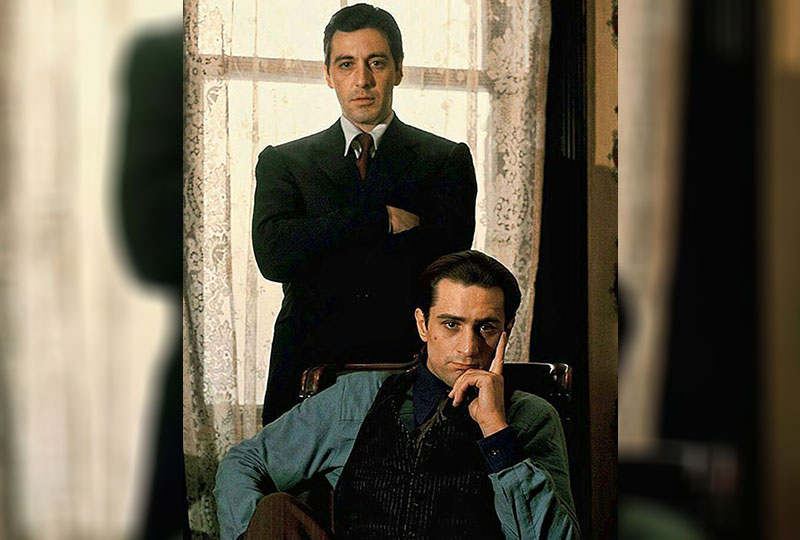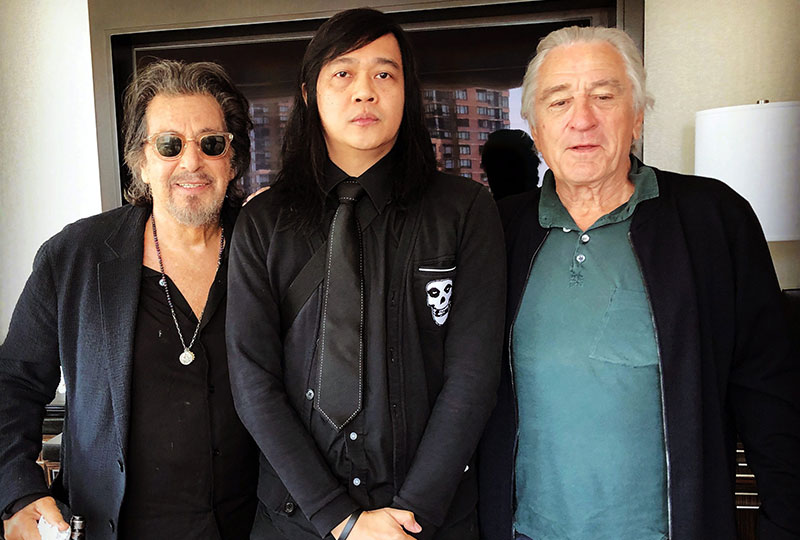Netflix presents ‘The Irishman’ Robert De Niro & Al Pacino: An afternoon with the kings of New York

It does not get any better than this.
Robert De Niro.
Al Pacino.
One autumn afternoon in New York City.
Thus, I implore my Sony recorder to record everything: every word, every cough, every grunt and, if possible, every smile, shrug and scowl. How many people could say they were in the same room as two of the greatest actors of all time — the godfathers of method, madness and celluloid magic — inside the 40th-floor suite of a hotel across the street from Central Park with a table, a couple of chairs, tall windows, and the ghosts of iconic characters past — Travis Bickle, Tony Montana, Michael Corleone, Vito Corleone, Jake La Motta, Frank Serpico, Lt. Vincent Hanna, Neil McCauley… the list is endless. And the two’s latest movie titled The Irishman directed by Martin Scorsese adds two more names into the pantheon: the hitman Frank Sheeran played by De Niro and labor union leader Jimmy Hoffa played by Pacino. One is a methodical killing machine nurtured by the mob; the other is an activist full of sound and fury, clamoring for solidarity. Their paths inevitably intersecting.
Thus, we (three journalists from Japan, India and good ole R.P.) sit down with these two living legends for a post-lunch chat, our knees turning to spaghetti (to murder what Eminem raps about in Lose Yourself), trying to spread every grain of sand of our allotted 20 minutes, attempting to cram eternity into less than an hour.
A few minutes ago, we could hear them talking in the hallway. No, no, not about who was supposed to get whacked and why. More of the mundane, probably — if there is anything ordinary at all in the lives of these two actors who are vying for the title of G.O.A.T., and — for most of their lives — were up for the same roles. “If you don’t do Brian De Palma’s Scarface, I’m going to do it. You got to do it,” De Niro once told Pacino. Imagine that.
Robert De Niro comes across as dead serious, all business. He shakes hands firmly and locks eyes. Al Pacino is an uplifting presence. Like your favorite badass uncle. He is even apologetic about not being able to take off his sunglasses as he talks to us. The afternoon glare flitting through the buildings around Columbus Circle hurts his bloodshot eyes. Pacino says, “If you don’t mind, guys, I have to keep them on.”
Somebody asks how the relationship between the two actors evolved throughout the course of their careers.
De Niro says, “Well, I think we’re both happy to be working.”
“And alive (laughs),” adds Pacino.
“We’ve known each other a long time,” says De Niro. “And we have a special relationship. We get together from time to time. We talk. We help one another. We give each other advice.”
Pacino amplifies, “We knew each other when we were very young, too. Not well. But we had met. And we knew of each other. But at the time, we (already) had a certain comfort when we would meet. You know, we’ve been through a lot of the same things. Unusual stuff happened to us in this profession.”
It was in the late ’60s when they first bumped into each other. Pacino was walking down 14th Street in the East Village in the Big Apple, between Avenues B and C, with his then girlfriend, actress Jill Clayburgh. She pointed out to Al how good of an actor Bob was, having worked with him on a De Palma film, The Wedding Party. Al recalls seeing his future friend, rival and co-star: “There was something about him. He had charisma. He had a certain fire in him. He had such a presence — even on 14th Street (laughs).”
At that point, a lifetime of classic cinema still lay ahead of them: Martin Scorsese’s Taxi Driver and Raging Bull, Sidney Lumet’s Dog Day Afternoon, Brian De Palma’s Scarface and Carlito’s Way, Michael Cimino’s Deer Hunter, and Scorsese’s Goodfellas and Casino, etc. Pacino and De Niro would eventually become two of the brightest names in American cinema, expressing their genius in many of the greatest films of all time, becoming beacons for generations of actors to come. (Al’s cocaine-bingeing, little-friend AR-15 rifle-brandishing Tony Montana even became a poster boy for hip-hop and gangsta rap artists.) Pacino says that he and De Niro do not necessarily portray gangsters, criminals and crooked policemen on the silver screen.
“We play people,” he stresses.
The way the two would enflesh each character, and be as realistic and nuanced as possible, is legendary. Both studied under Lee Strasberg and have taken Method Acting to the Bronx and beyond, taking great pains to prepare for roles in those iconic movies, staying in character both on and off the set. Pacino looks back and admits what a lonely and difficult undertaking that was.
For Taxi Driver, De Niro obtained a cab driver’s license and picked up passengers while on breaks from filming. Rumor has it that he even wore Al Capone’s underwear for The Untouchables. For his Academy Award-winning performance in Scent of a Woman in which he plays a blind man, Pacino claimed he actually couldn’t see while filming. “Congratulations,” he wrote to co-star Chris O’Donnell, “although I didn’t see you, I know you were great.” Ah, the pounds put on by De Niro to depict a boxer’s over-the-hill scenes in Raging Bull. And, oh, Pacino even made a citizen’s arrest while portraying an NYPD officer in Serpico.

Certainly for a rich body of work, there are bound to be clunkers. Rocky & Bullwinkle and Jack and Jill, anyone? On the flight home from New York, I would watch De Niro in The Intern and be baffled accordingly as to why the Great One would be slumming in an Anne Hathaway film for millennials and online entrepreneurs. For Al, his enabler (or, to be more precise, disabler) would be Adam Sandler, who has dragged everyone from Jack Nicholson to Christopher Walken to Harvey Keitel to the torturous purgatory of mediocre comedies. But even for Bob Dylan and his songwriting sublimity, they can’t all be Tangled Up in Blue or Like a Rolling Stone. Sometimes “Wiggle wiggle like a bowl of soup” or a song such as It Must Be Santa gets into the cracks of the discography. Even Picasso had a shooting slump. Kerouac also threw airballs.
But the sheer brilliance outweigh the filmic millstones. Pacino and De Niro would both appear in The Godfather Part II in 1974, although in different time frames, Al as Michael Corleone and Bob as the young Vito Corleone (which was essayed by the great Marlon Brando in first film). For his role as the young Don, De Niro won an Oscar for Best Supporting Actor. In the 1995 film Heat, the two would play characters representing two opposing forces (an LAPD robbery-homicide detective versus a career criminal). This dichotomy would influence Christopher Nolan’s The Dark Knight in terms of the ideological battle between Christian Bale’s Batman and Heath Ledger’s Joker. The classic, classic scene in Heat is when Lt. Vincent Hanna and Neil McCauley have a philosophical tête-à-tête in a restaurant. Curiously, that is one of only two scenes shared by the two in Heat. It is like a chess match, a ballet of braininess. The acting is impeccable. Give these guys a Chili’s menu and they would make it sound like a Greek drama or f*cking King Lear, ordering tostada chips and salsa in iambic pentameter, hoo-ah.
Years later, Pacino and De Niro would indulge the fans by appearing together in Righteous Kill, a plodding crime thriller featuring, er, detectives Rooster and Turk. A lamentable moment in the De Niro-Pacino cinematic canon. One critic called it “self-righteous tedium.”
When the two were in London (or was it Paris?) promoting Righteous Kill, they were able to see for themselves — up close and in their very faces — the adulation of the masses. They were like rockstars. There is a different dynamic whenever they do a movie together, a sense of gravitas. It is something momentous.
De Niro recalls, “(I told Al), you know, it’s so nice that there are so many people — with this big premiere in the street and everything. Let’s hope that we are going to do something really special the next time that we are in this situation.”
Pacino agrees, “That was very interesting because it was kind of a prophetic thought. But we both knew that we wanted to do something. Because Heat was so positive.”
De Niro adds, “Yeah, we were at the openings, premieres (for Righteous Kill) in Europe. We felt, ‘It’s so nice, all of this.’ So, we want to be able to feel that we have given them something. That we deserve this kind of adulation or whatever you want to call it. So, we were lucky enough to do something that we feel very strongly and good about — this movie.”
And it is called The Irishman.

Luck OF the Irish
The Irishman, which was based on the book I Heard You Paint Houses by Charles Brandt, is everything that it is hyped up to be — and then some.
The day before the interview with De Niro and Pacino, we journalists were invited by Netflix to the Dolby 88 theater along 6th Avenue to watch the film right after a quick breakfast of coffee and NYC bagels, and it was three-and-a-half hours of cinematic bliss. The gang’s all here: Joe Pesci (who is back after a long hiatus that began in 2006) and Harvey Keitel (who starred in 1973’s Mean Streets, which also featured De Niro), along with an excellent supporting cast, including Bobby Cannavale (who has a very intimidating onscreen presence), that Everybody Loves Raymond dude, as well as Stephen Graham who was excellent as the irascible fascist (Combo!) in This Is England. He was also impressive as Capone in Boardwalk Empire.
The Irishman is nothing short of epic as if follows the exploits of Frank “The Irishman” Sheeran as an enforcer for the Bufalino crime family, backdropped by key events in America’s history: the Bay of Pigs invasion, the Kennedy assassination, the rise of the Teamsters, the disappearance of Jimmy Hoffa. Don’t worry, this is not a Mafioso version of Forrest Gump. Nor is it filmic fodder for conspiracy theorists.
Sheeran (played by De Niro) would develop a strong friendship with labor leader Hoffa (played by Pacino). The Irishman, an underworld saga spanning from the ’40s to the early 2000s, touches on universal themes such as love, friendship, betrayal, choices, guilt and forgiveness. A shot to the head as well as a pinch to the heart. It is about morality, power, and the true dark forces in our nature that easily could take over. The director explained during an On Cinema discussion: “Power erases everything else. It’s not about money. It’s all about power. And, as you know, they will do anything to keep that power.” In a sense, it is a distillation, a masterful summation of all the brilliant mob dramas Martin Scorsese has done in the past — from Goodfellas to Casino to The Departed. You could consider it “an apotheosis,” the most mature in the mobster opus.
Goodfellas has the glamour. It is a descent into the lovely hells of the mob life. Casino throws around its weight in gold, letting the chips fall where they may. The Irishman has burned all of its dark energy and has no distance left to run, hence the time for reckoning, remorse and introspection. (More about the movie in a future article in The STAR: how De Niro, Pesci and Pacino were “digitally de-aged” by — I kid you not! — Lucasfilm’s VFX and animation studio for most of the scenes [Scorsese calls the entire process “youthification”], and how Netflix came in and footed the production bill in order for the film to, well, exist.)
During the course of filming was there a time when De Niro and Pacino looked at each other and realized they were working on something really special? One that could erase the memory of the travesty that was Righteous Kill?
De Niro explains, “I thought the book was so special. And (it had) so much feelings, heart, details, specifics. And then to get Al and Joe (to have them onboard), and Marty (to put it all together)… I am happy that it’s getting such a great reaction.” Critics call The Irishman “phenomenal,” by the way, after watching its premiere in late September at the 57th New York Film Festival at the Lincoln Center.
He continues, “Because the intention was to make something very special. But do you really know if you’re making something special? You can never tell. You just never know, you never know. So I’m happy that it’s gotten a good reaction.”
Pacino nods. “Bob saw this project, he read it, and he had the foresight to say, ‘There’s something here that we can do.’ It’s wonderful when that happens.”

Postscript
After the interview, De Niro walks towards me and asks about the Philippines.
“Do you really like Manila, Mr. De Niro?” I ask, my words staggering out of my mouth like so many goons whenever there is a baptism or a wedding in those Godfather movies.
“Yeah, but I haven’t seen as much of Manila,” he answers, adding that he usually takes an hour-and-a-half flight from the capital to Amanpulo in Palawan. “Maybe in another time I would be able to see more of the city.”
With that, Robert De Niro and Al Pacino leave the suite and head into another room for more interviews and photoshoots. It wouldn’t be out of the place if the piped-in speakers of the hotel started blaring Sid Vicious’ rendition of My Way. These two absolutely did it their way. And we are left hanging with a thousand questions to ask them. Oh well, maybe the answers are in their movies all along: all uttered by iconic antiheroes who tell the truth, the whole truth, the goddamn truth, even when they lie.
* * *
The Irishman starts streaming on Netflix on Nov. 27 after a limited theatrical run. Special thanks to Mae Vecina, Lana Chan and Joanna Mendoza of Ad Pub Hub.















